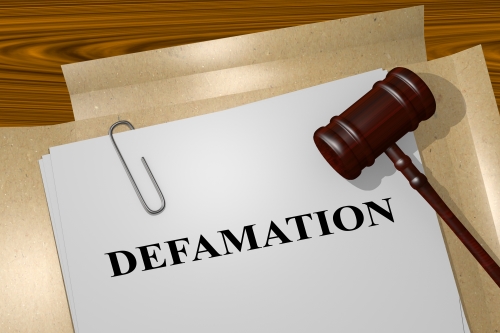“The internet and the numerous publishing platforms enabled by social media sites have provided an unbelievable ability to self-publish, giving anyone with internet access a worldwide audience. For most people, this means they share family photos… But for others, the ability to self-publish provides a weapon to punish, defame, stalk, and harass.”
 Robert Willison, an Atlanta real estate investor, could not believe what he was seeing on the computer screen. A business associate had mentioned that Mr. Willison might want to Google himself, as some odd search results were appearing.
Robert Willison, an Atlanta real estate investor, could not believe what he was seeing on the computer screen. A business associate had mentioned that Mr. Willison might want to Google himself, as some odd search results were appearing.
And there they were. Post after post after post, across numerous websites and social media platforms, alleging that Mr. Willison was a sociopathic criminal. According to the posts, Mr. Willison sold drugs to federal judges, stole credit cards numbers, stole money, made death threats, committed home invasions, masterminded a Ponzi scheme, and more.
Mr. Willison knew immediately who was behind it. A few months prior, he had caught a former employee kiting checks and embezzling money. The man was being investigated by the district attorney’s office, and likely was heading to prison. Mr. Willison was slated to be the primary witness. The smear campaign was undoubtedly designed to discredit Mr. Willison before he testified.
That day marked the beginning of a three-year saga for Mr. Willison. The posts continued, and the antics escalated. The savvy ex-employee filed numerous criminal and civil actions against Mr. Willison, which shrouded their publication in privilege.
Mr. Willison considered filing defamation lawsuits, but he realized that any such case would require him to turn over extremely personal financials and other records. He also knew that the perpetrator was almost penniless, and judgment proof.
Instead, Mr. Willison took a different approach, which resulted in removal of the defamatory content and some positive press. Today, Mr. Willison’s online presence reflects a successful real estate business, not a psychopath engaged in prolific criminal acts.
Mr. Willison’s story is scary, and unfortunately, he is not alone. The internet and the numerous publishing platforms enabled by social media sites have provided an unbelievable ability to self-publish, giving anyone with internet access a worldwide audience. For most people, this means they share family photos, cat videos, opinions on politics and news stories, or their thoughts on a hot topic in their professional industry. But for others, the ability to self-publish provides a weapon to punish, defame, stalk, and harass.
Understanding the best practices for handling these situations can help turn them around, just as Mr. Willison did, to protect your online reputation – a valuable component to both an individual and their business’s intellectual property.
What is Defamation?
Defamation is the publication of an unprivileged factual statement that is untrue, which damages another’s reputation, and which was made with the requisite degree of fault.
This is a surprisingly high bar, considering what is not defamation:
- True statements
- Opinions
- Hyperbole
- Statements from legal proceedings
- Statements made with a reasonable belief they were true
- Legislative statements made by legislators
And there are the examples of what is usually not defamation, as a result of a qualified privilege or other defense:
- Many statements made regarding potential employment hires
- Statements made in government reports
- Citizen testimony in legislative proceedings
- Statements that are fair comment on a matter of public interest
- Statements made about someone with a poor reputation already
- Fair reports of government proceedings
- Statements made more than a year ago
Who is Liable for Defamation?
In most contexts, the person or entity that published the content, as well as those who republish the content are liable. Web hosts are immune from liability for what their users post under Section 230 of the Communications Decency Act. This means that Facebook cannot be liable for what its users publish on its website.
First Steps in Addressing Online Defamation.
The first step should rarely, if ever, be a lawsuit. Not only are lawsuits expensive and hard to win, but many courts have found that injunctions violate the First Amendment. In other words, the remedy may not be that the post is ordered removed.
Some better strategies and options include:
- Don’t retaliate. Not only does retaliation further energize the perpetrator and invite more negative content, but it may improve the search rankings of the post.
- Request that the content be removed because it violates the website’s terms of use, or because it violates trademark or copyright laws. If you don’t get an adequate response from utilizing the forum’s complaint forms, hire an attorney to write a letter. Provide as much substantiation and backup as possible. Using this strategy, Mr. Willison had the defamatory listings removed one at a time, over a period of years. Be prepared to be diligent and patient, recognizing it often takes more than one communication to get the post removed.
- Proactively seek reputation-enhancing content. Public relations firms are quite adept at getting their clients featured in news stories. A false, bad review of a restaurant is easily negated by a positive story about the restaurant in a local paper. Mr. Willison was featured on a local news story about online defamation. He was able to share his horrific experience, provide context to any of the posts that remained online, and rebuild his reputation in the community, all in a news segment that was less than two minutes long, but which remains online to this day. News articles and stories not only can correct the misinformation and put the victim in a positive light, but the typically rank higher in search engines, and will be read first.
Litigation Tips
If the practical strategies don’t work, it may be time to consider a lawsuit. Libel cases are full of traps for the unwary, and careful strategy is critical.
Document the content. Be sure to capture screenshots of the content at issue, preferably by a neutral third party that can attest to the date and accuracy of the screen capture. Also capture all of the comments that may have been made by other users in response to the initial post. These comments may enhance your claim by showing that the post was widely read, that it was believed to be true, and that people reacted negatively towards it.
Seek a retraction. Many states limit remedies to plaintiffs who have not properly complied with the state’s retraction statute. Check your state laws and make sure a proper retraction demand has been made before filing suit.
Sue the right entities. The host of the content is typically immune from liability. Review the protections afforded by Section 230 of the Communications Decency Act and avoid drawing in the content host unless you are confident that Section 230 does not apply. Also, even if you have strong suspicions as to the true identity of the publisher, if your defendant is an anonymous poster, you may have to sue a John Doe and subpoena the host to prove you have sued the correct party.
Be absolutely sure you have a claim. Carefully scrutinize the statements at issue and ensure that you truly have a false statement of fact, published with the requisite degree of fault, and not subject to any applicable privilege. Many states have enacted anti-SLAPP statutes that may result in very early scrutiny of your complaint and its likelihood of success on the merits. If you lose the anti-SLAPP motion, you will be required to pay the defendant’s attorney’s fees. It’s best to hire an attorney experienced in libel cases to ensure that the complaint will withstand an anti-SLAPP challenge.
Timely file. Be sure you keep an eye on the statute of limitations, when in many states is only one year from publication. Typically, the statute of limitations begins running on the date of publication, regardless of whether the content remains online. This is not intuitive for IP lawyers, who are familiar with the rule in copyright cases, where the statute of limitations does not run so long as the infringement remains online.
Be realistic about remedies. Many keyboard warriors turn out to be insolvent. Many courts won’t award an injunction. Carefully consider what you realistically can achieve, even if you win.
Image Source: Deposit Photos
Author: Premium_shots
Image ID: 102636534

![[IPWatchdog Logo]](https://ipwatchdog.com/wp-content/themes/IPWatchdog%20-%202023/assets/images/temp/logo-small@2x.png)

![[[Advertisement]]](https://ipwatchdog.com/wp-content/uploads/2023/01/2021-Patent-Practice-on-Demand-1.png)
![[Advertisement]](https://ipwatchdog.com/wp-content/uploads/2024/03/IP-Copilot-Apr-16-2024-sidebar-700x500-scaled-1.jpeg)
![[Advertisement]](https://ipwatchdog.com/wp-content/uploads/2024/04/Patent-Litigation-Masters-2024-sidebar-early-bird-ends-Apr-21-last-chance-700x500-1.jpg)

![[Advertisement]](https://ipwatchdog.com/wp-content/uploads/2021/12/WEBINAR-336-x-280-px.png)
![[Advertisement]](https://ipwatchdog.com/wp-content/uploads/2021/12/2021-Patent-Practice-on-Demand-recorded-Feb-2021-336-x-280.jpg)
![[Advertisement]](https://ipwatchdog.com/wp-content/uploads/2021/12/Ad-4-The-Invent-Patent-System™.png)







Join the Discussion
One comment so far.
box7003
August 28, 2021 04:50 pmThank you for posting! Useful info. the internet has its own laws.